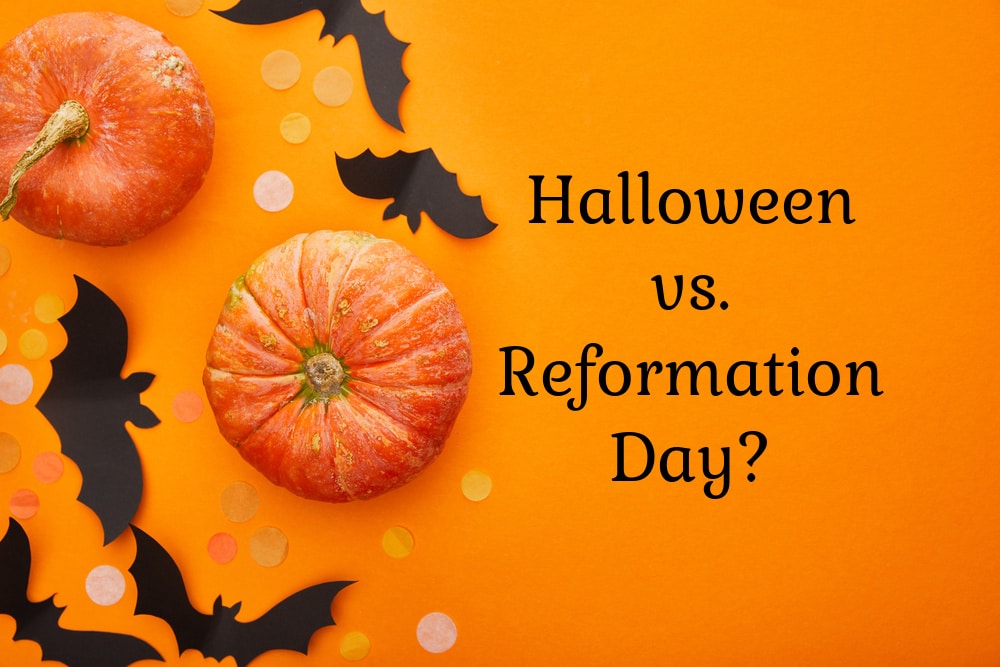
31 Oct, 2022 A Christ-Centered Approach to Halloween (Reformation Day)
Biblical Opinion & Advice
By Summer Lane
Image: Deposit Photos
Traditionally, October 31 heralds the beginning of spooky festivities ranging from watching gory Halloween movies to the far tamer event of taking children trick-or-treating.
However your family celebrated Halloween growing up, the general holiday celebrations were likely centered around ghosts, witches, and black cats traipsing beneath an eerie yellow moon. And hey – what’s wrong with that, right? It’s just a little old-fashioned, fake-blood-spraying, axe-wielding, Exorcist-themed fun!
Or…is it?
Before you get too tangled up in the white sheet that you’re trying to use as a ghost costume for your toddler (yep, I know how that goes!), let’s look at the dark and light sides of Halloween, and how Christians can utilize their independent agency and liberty to elevate the gospel message on what is, arguably, the darkest spiritual night of the year.
Reformation Day
On October 31, 1517, Martin Luther nailed his Ninety-Five Thesis to the doors of the Wittenberg Castle Church and powerfully kickstarted the beginning of a revival of Christian zeal and the propagation of mission work. Ligonier says this about Luther’s scholarly and inspirational move:
What is Reformation Day? It is the day the light of the gospel broke forth out of darkness. It was the day that began the Protestant Reformation. It was a day that led to Martin Luther, John Calvin, John Knox, and many other Reformers helping the church find its way back to God’s Word as the only supreme authority for faith and life and leading the church back to the glorious doctrines of justification by grace alone, through faith alone, in Christ alone. It kindled the fires of missionary endeavors, it led to hymn writing and congregational singing, and it led to the centrality of the sermon and preaching for the people of God. It is the celebration of a theological, ecclesiastical, and cultural transformation.
So we celebrate Reformation Day. This day reminds us to be thankful for our past and to the monk turned Reformer. What’s more, this day reminds us of our duty, our obligation, to keep the light of the gospel at the center of all we do.
Most Americans have no idea that October 31 is the day when Luther took those historic steps toward reminding Europe (and the world) about the truth of the Gospel. It signaled a historic break from the Roman Catholic Church, and it started a wildfire of revival that could not be stopped – not even by jail, suppression, and bloody persecution.
Ironically, October 31 is the day where most people elevate the mysticism and witchcraft surrounding Halloween – almost as if in direct defiance of the truth of the Gospel.
Happy Reformation Day to all who celebrate! pic.twitter.com/6xuxZyAoZ5
— Jenna Ellis 🍊🦅 (@JennaEllisEsq) October 31, 2022
Does that mean Christians can’t celebrate Halloween?
I personally believe that there is a fair amount of room or liberty, if you will, that the Christian can use when examining the issue of Halloween. Many churches provide an alternative to Halloween celebrations by offering “Harvest Nights” or “Fall Family Nights.” This provides a safe, clean, and healthy environment for families of the community where they can not only be shielded from the spiritual darkness surrounding Halloween but have an opportunity to hear the gospel.
Halloween in and of itself does not have to be an “evil” holiday. I do think that too many Christians get stuck in a legalistic mindset on this, relegating Halloween to a cut-and-dried category of “Satan and Ghosts and Other Bad Stuff,” and by doing so, actually miss out on an opportunity to use what is meant for spiritual darkness for something that can provide light to the world (Genesis 50:20).
Unfortunately, the American media has constructed an entire culture around Halloween. According to History, the tradition of Halloween dates back to the ancient Celtic festival of Samhain, where people would dress up in eerie costumes to attempt to ward off ghosts or evil spirits. Per their research, Pope Gregory III decided to make November 1 All Saints Day, and the evening before the holiday was dubbed “All Hallow’s Eve.” Their article states this, too:
“Celts believed that on the night before the new year, the boundary between the worlds of the living and the dead became blurred. On the night of October 31 they celebrated Samhain, when it was believed that the ghosts of the dead returned to earth…To commemorate the event, Druids built huge sacred bonfires, where the people gathered to burn crops and animals as sacrifices to the Celtic deities. During the celebration, the Celts wore costumes, typically consisting of animal heads and skins, and attempted to tell each other’s fortunes.”
The very premise of Halloween itself is in direct violation of Scriptural commands to stay away from divination, soothsaying, witchcraft, and contacting the dead (Gal. 5:19-21, Deut. 18:10-14, Ecc. 9:4-6, Exodus 22:18, etc.).
Clearly, there is a line here that Christians should not cross. We should not celebrate witchcraft. We should not celebrate horror movies (which often focus on demon-possession, murder, and magic). We should not dress up as demons, ghosts, witches, or any characters that are included in these categories, either.
Does that mean that the Christian can’t touch Halloween with a ten-foot pole? I suggest an alternative approach, especially when dealing with children. Halloween is a big part of American culture, and it is possible for the Christian to present a parallel culture when dealing with this so-called “holiday.”
Little girls dressing up as princesses and collecting Tootsie rolls at church is a lot different than a gaggle of teenagers gathered around a Ouija board in the living room with the lights out.
Halloween, for the Christian, can present an opportunity to shine a light into a terribly dark night. I recommend honesty with your kids when they are old enough/mature enough to understand the history of Halloween alongside Reformation Day. Ask them what they think – the two historical markers exist in an unflinching dichotomy to each other, and I really don’t believe in coincidences. Do you?
Is dressing up like a princess, eating pizza, and tossing beanbags in the church parking lot wicked? Of course not. Like any other godless or even satanic tradition that the world has latched onto, Christians can always flip the script and bring the message back to what matters: THE GOSPEL.
You can keep Halloween light-hearted and Christ-centered. Wisely approaching Halloween is mostly about being an informed parent who cares enough to shield their child from the wickedness of the world during the tender years of toddlerhood, while slowly preparing them for the gritty realities that wait beyond the ivory tower of childhood innocence.
The Apostle Paul gives us insight into balancing self-discipline and adherence to God’s law with dealing with the cultures of his day (which is no different than what we deal with today):
19 For though I am free from all, I have made myself a servant to all, that I might win more of them. 20 To the Jews I became as a Jew, in order to win Jews. To those under the law I became as one under the law (though not being myself under the law) that I might win those under the law. 21 To those outside the law I became as one outside the law (not being outside the law of God but under the law of Christ) that I might win those outside the law. 22 To the weak I became weak, that I might win the weak. I have become all things to all people, that by all means I might save some. 23 I do it all for the sake of the gospel, that I may share with them in its blessings.
24 Do you not know that in a race all the runners run, but only one receives the prize? So run that you may obtain it. 25 Every athlete exercises self-control in all things. They do it to receive a perishable wreath, but we an imperishable. 26 So I do not run aimlessly; I do not box as one beating the air. 27 But I discipline my body and keep it under control,[b] lest after preaching to others I myself should be disqualified.
1 Corinthians 9:19-26
Paul is giving us a roadmap to success. Use what culture has already established as a springboard to spread the truth of the Gospel! You don’t need to partake in the darkness of Halloween to tell people about Jesus. You can let your seven-year-old dress up at Captain Nemo and carve a pumpkin. Use common sense. Use maturity. Use discernment. Honor what God says needs to be honored, and don’t get paralyzed by fear over the concept of Halloween, if you’re worried about it.
Remember this:
Behold, I have given you authority to tread on serpents and scorpions, and over all the power of the enemy, and nothing shall hurt you. (Luke 10:19)
The opinions in this article are specific to its author, and do not necessarily reflect the opinions of the entire Counter Culture Mom team.
*
Summer Lane is the #1 bestselling author of 30 books, including the hit Collapse Series and Resurrection Series. She is an experienced journalist and columnist who reports on news within the U.S. and abroad. Additionally, she analyzes politics and policies in weekly op/Eds on The Write Revolution.
Summer is also a mom and wife who enjoys rural country living, herding cats, and gardening. She is passionate about writing about women’s issues, parenting, and politics from a theologically-grounded perspective that points readers to the good news of the gospel.
Download Our New Counter Culture Mom App to get our trending news and pop culture alert notifications. Connect with other parents in the Parent Chat section to gain helpful ideas on how to counteract the Pop Culture Cult!
Be sure to contact us if there is an issue you would like to have us write about! Our mission is to help parents deal with today’s lifestyle trends and how to biblically navigate them.





No Comments